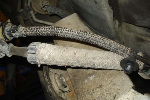I started out with a leak in the radiator of my 91 4.0 ranger. Replaced it only to have that one blow before I realized the the system was building up to much pressure, could hear a faint percolating sound that you could also feel when holding the upper rad. hose. I was told that a crack head was most likely the cause.
I have another motor out of a 94 explorer and my question would be, can I just put the heads off of it onto the 91 motor. or would I need to strip the 94 down to a long block and swap the whole thing. I don't have the harness or computer for the 94 so I would need to eliminate a few sensors that the 91 doesn't have like the cam sensor.
Any help would be great.
Thanks.
I have another motor out of a 94 explorer and my question would be, can I just put the heads off of it onto the 91 motor. or would I need to strip the 94 down to a long block and swap the whole thing. I don't have the harness or computer for the 94 so I would need to eliminate a few sensors that the 91 doesn't have like the cam sensor.
Any help would be great.
Thanks.










